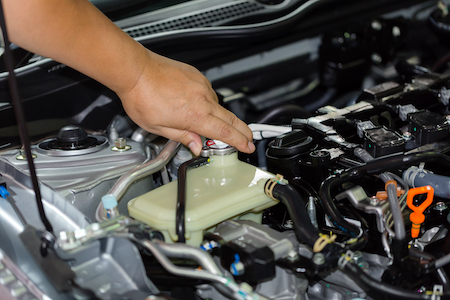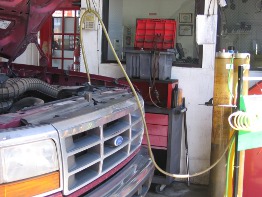Denver is breaking temperature records every single year. It hit 102 in July 2021, 103 in July 2016, and 104 in June 2018. Will we see 105 this year?
When the temperatures creep upwards, it’s important to ensure your car is ready for the heat. Car’s today are built with an internal system to monitor heat and protect the engine. The engine uses antifreeze to keep your engine running, and the entire system cool.
Is it running properly? Is it time for a radiator flush (also known as a coolant flush)?
It’s essential to keep your vehicle’s coolant fresh by following manufacturer’s guidelines. Ready to learn more?
What a vehicle’s cooling system does
If you’ve ever stood near the hood of your vehicle after driving on the highway for a while, you know how much heat is produced underneath the hood. Imagine the parts in action as you fly down the highway at 50, 60, even 70 miles an hour or more. All of that action creates a tremendous amount of heat.
While the components of a vehicle are created for intense heat, car designers also build in a cooling system to counterbalance the heat, and make sure every part in the system remains in good working condition as you drive.
If your vehicle didn’t have an effective cooling system, the engine would heat up and stop functioning in a matter of minutes.
It’s equally important to keep in mind that the cooling system has a job to perform year-round. It works hard to protect the engine as temperatures soar over 100 degrees Fahrenheit, as well as safeguard the engine when temperatures fall below zero.
Most engines today use a liquid cooling system that works by passing liquid continually through the engine block. Coolant, or antifreeze, is pushed through the engine via the water pump, absorbing heat as it moves through the passages.
As the liquid leaves the engine, it travels to the radiator where it is cooled by an air stream entering through the grill of the car. It cools enough inside the radiator to return once again into the engine, pick up heat, and repeat the process again.
A thermostat is located between the engine and the radiator to monitor the coolant’s temperature. If the coolant is above a certain temperature, it flows into the radiator to cool. If it’s below, it circulates back into the engine.
This coolant continues to circulate throughout its life, heating and cooling to protect the internal components of the engine compartment. Coolant, or antifreeze, is composed of ethylene glycol, designed to withstand temperatures tens of degrees below zero, and engine temperatures reaching 250 degrees or above. For most climates, a concentration of 50 percent antifreeze and 50 percent water is sufficient to get the job done. It’s highly poisonous to humans and animals, so keeping it away from both is important. Its slightly sweet fragrance can attract animals and children; take appropriate protection measures.
Why a radiator flush is needed
Like other fluids in your vehicle, coolant is designed to run nonstop while the engine is operational. Radiator fluid is a protection device, designed to heat and cool as it flows through the system, keeping the components clean and running to do their job well.
Over time, coolant can start to pick up dirt, debris, and other contaminants that build up in the system. This can lead to corrosion, scaling, rust, or other potential problems that you do not want in your engine or radiator.
A radiator flush solves this problem. It’s designed to keep the entire cooling system in pristine shape. Think of it as a blood transfusion of the cooling system.
A radiator flush forces several gallons of cleaner, water, and coolant through the system, eliminating contaminants or build-ups that may have been deposited since the last flush.
Simply draining the radiator doesn’t do a proper job of removing contaminants. Trace debris may still be stuck inside the system, attached to the various components. By flushing the system, you remove these deposits and create a clean system once again.
A radiator flush is also designed to repair and protect the various components that may have weakened with age. When you use the right additives and perform a radiator flush as suggested by your car’s manufacturer, it can lubricate the various parts, lengthen the life of the water pump, and help prevent future corrosion before it starts.
Is it time for a radiator flush?
As a general rule of thumb, most manufacturers recommend having a radiator flush performed every 30,000 miles or 5 years, whichever comes first. Of course, your manufacturer knows best based on how the system was designed. Follow their suggestions to ensure a long life.
Driving conditions can also impact expectations. Driving up and down the mountain each day can add to the stress of the coolant system. Pulling heavy loads continually can also impact the system. You know your driving conditions best. If you feel your car could benefit from a radiator flush, erring on the side of caution is always best.
Your vehicle will also give you a sign if it’s time for a radiator flush:
- You notice a leak by way of a puddle of coolant underneath your car
- You notice a knocking sound in the engine compartment as you driv
- Your car starts to overheat
- You notice visible debris in the coolant
- Steam or an odd smell coming from underneath the hood
What happens if you don’t flush the radiator
Is a radiator flush really necessary?
When there is a problem inside the cooling system, you’ll notice any one of the symptoms from above. It can start in the form of a leak, migrate to a knocking sound in the engine, and eventually cause your engine to overheat. The problems won’t go away if you don’t take care of the problem.
If left unchecked, the symptoms escalate and you wind up with even bigger problems. Further corrosion. Larger leaks. Failing components. Bigger repair bills.
The easiest way to stop the problem in its tracks is to stick with a schedule and get a radiator flush from time to time, to keep your cooling system operating well.
When was the last time your car had a radiator flush?


 So, instead of buying new, people are finding ways to take better care of their current car to extend its life. The maintenance is worth the money because more and more cars are staying on the highway well past 100,000 miles. Here are some tips to help you keep your current car rolling down the road.
So, instead of buying new, people are finding ways to take better care of their current car to extend its life. The maintenance is worth the money because more and more cars are staying on the highway well past 100,000 miles. Here are some tips to help you keep your current car rolling down the road.